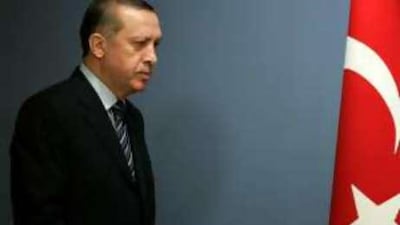ISTANBUL // A mix of political defeats, growing economic problems and corruption scandals has pricked the aura of invincible political power surrounding Recep Tayyip Erdogan, Turkey's prime minister, who has been reminded by one prominent newspaper columnist that no one stays at the top forever. Mr Erdogan, 54, has been prime minister since 2003 and is the most powerful leader Turkey has had in decades. His government can rely on the comfortable majority of his religiously conservative Justice and Development Party, or AKP, in parliament. The AKP, which won a landslide victory in a general election last year with almost 47 per cent of the vote, has 339 deputies in the chamber of 550 seats.
But even though Mr Erdogan's government persuaded the European Union to start membership negotiations with Turkey in 2005, has presided over an impressive economic boom in recent years and has improved the country's human rights record, discontent is growing. "No party can stay in power eternally," wrote Mehmet Barlas, a columnist for the daily Sabah newspaper, which is considered to be sympathetic to the government. "If a party is very strong for a period of time and even if it is without alternative, this is temporary. A foreign event, an economic crisis, a big scandal can change the whole situation."
Mr Erdogan seems to have been hit with several of these at once. He failed to secure an end to the headscarf ban at Turkey's universities, a key issue for the AKP's more pious voters, and the AKP itself narrowly escaped being shut down by the country's Constitutional Court after the chief prosecutor accused the ruling party of being an Islamic organisation. The AKP's reputation of being the guarantor of economic growth and stability has also suffered. After almost six and a half years of uninterrupted economic growth that peaked at almost 10 per cent annually, a period that saw a large-scale liberalisation including the privatisation of many state companies, Turkey's economy has slowed down considerably, the growth rate dropping to 1.9 per cent in the second quarter of this year.
Polls show that the Turks' confidence in the economy has been shaken. In a recent survey, 41 per cent said they expected next year to be worse than this one, and only 30 per cent expressed optimism, pollster Adil Gur told the Taraf newspaper. A further worsening of the economic situation would significantly hurt Turkey's middle and lower classes, important voter groups for the AKP. Just as bad for Mr Erdogan, the AKP has been rocked by a series of corruption scandals. For a party that was founded by Mr Erdogan in 2001 as a new political force that would end the corruption by party politicians in Ankara, these scandals are especially painful. The word "ak" means "white" or "clean" in Turkish.
Earlier this month, Saban Disli, a deputy party chief of the AKP, was forced to resign after being accused of taking a US$1 million (Dh3.67m) bribe in a real estate deal. In the western city of Izmir, AKP politicians publicly accused a local party leader of corruption. Last week, a court in Germany handed down jail sentences to three officials of "Deniz Feneri", or Lighthouse, a Turkish charity accused of raising money from Turks in Germany and then transferring large sums to companies in Turkey. Leading Lighthouse representatives are AKP members, and the opposition in Ankara says the money was used to finance media close to the AKP, and that parts of it may have ended up with the party itself.
The AKP denies the accusations, but even some of its top officials are uneasy. People guilty of corruption "have to be pushed out, whatever their political identity may be", Bulent Arinc, a former parliamentary speaker, said. "Every crime, every accusation has to be investigated. One cannot avoid this issue just by cursing it." AKP followers have begun to voice their frustration. The scandal surrounding the Lighthouse charity "has created a trauma in conservative circles", Ali Bulac, a columnist with the pro-government daily Zaman, told the news channel NTV. Mr Bulac estimated that about half of the religiously conservative supporters of the AKP thought the scandal was fabricated by opponents of the government or maybe even by Germany in order to create trouble for the Erdogan government. "But in the other 50 per cent segment, people say, 'No, there is serious corruption'."
The weakness of Turkey's opposition parties, which have not been able to strengthen their support since they were trounced by the AKP last year, means that for all his problems, Mr Erdogan does not have to fear the next election day. Mr Gur said he expected the AKP to reach 60 per cent in local elections next spring, but that a worsening of economic conditions could threaten a new triumph for Mr Erdogan.
"People's prime concern is food on the table, a job and money," Mr Gur said. If the Turkish lira were to dramatically drop in value against the dollar and the euro, "the AKP will lose 15 per cent", he said. "It's that simple." tseibert@thenational.ae By engaging in a bitter war of words with Turkey's largest media mogul, Aydin Dogan, Mr Erdogan has added to the growing unease. "The problem is not the Islamic side of the AKP, let alone its liberalism, but rather its swing to Turkish politics as usual - a leader-dominated and nepotism-oriented structure that favours tension to reconciliation and machismo to civility," columnist Mustafa Akyol wrote in the Turkish Daily News, an English-language newspaper.

